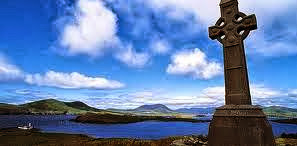The Idea of the Holy
I like the title because I believe “the idea of the holy”
summarizes what I believe is a big problem for contemporary Americans,
especially the young. For many, the word “holy” is an enigma. It’s not in our vocabulary.
We don’t know exactly what it means, and seldom use the word.
It’s one of those churchy words that make little sense to most
contemporary people. I often think of this when singing, “Holy, holy, holy…” at
Mass. As a
believer, I can make the words my own, but are those words, and the whole
vocabulary of religion, meaningful to the majority of young (and many older)
people today? I don’t think so.
Here is a bunch of other words, common in church circles,
that may cause some head scratching among many people: salvation; transcendence;
sin; redemption; Eucharist; sacrament; virtue; trinity; bless and blessing;
spirit and spirituality; discipleship; soul; the sacred; and the word “church”
itself. (I’m not going to mention that puzzling word, “consubstantial,” with
which we Catholics are assaulted in the new translation of the creed at Mass. )
The eyes-glaze-over
button
When many people, including the young, hear these words, it’s
like pushing a button that makes their eyes glaze over. The words are not part
of our daily lives. They’re words that the clergy uses. They have nothing to do
with me or my life. The vocabulary of religion, I believe, is one of the things
that make religion seem irrelevant. And many ask why religious people don’t
speak plainly about God and the faith.
Some of these words and phrases are simply from a previous
era. They’re verbal antiques. Others are more than that.
Here’s the problem. How do you use everyday language to
describe something that is, or someone who is, indescribable? The experience of
mystics and religious people through the ages could not be adequately expressed
in everyday language. So, words and phrases were invented that the inventors
believed better express the experience.
The word “holy,” for instance, has meant for religious people
the idea that God
eludes comprehension. He/she just doesn’t fit
into our rational categories. For most religious people, God is so unlike us
(except for Jesus, believed by most Christians to be God and human) and so
unlike anything we have experienced, we don’t have an adequate vocabulary to
describe him/her. Holy, in whatever language it was first used, was the best
they could come up with.
The word may be archaic, but the idea isn’t
The word “holy” may be archaic,
but the idea is not. If any of those extraordinary happenings in the Bible are
true, all you can say is, “Wow!” And because of what we now know about the inconceivable,
expanding universe, the idea of the holy is more meaningful than ever. If there
is a God behind creation – and I believe there’s good reason to believe there
is – how awesome must he/she be? “Incredible!” And yeh, “Holy!”
For many searchers of God,
however, the problem remains. Can you continue searching without adopting all
those churchy words? I think so. What if you find God; do you have to adopt the
vocabulary? It depends on the form. If you adopt a religion, it’s convenient to
adopt the religion’s vocabulary.
Meanwhile, I believe that for the
sake of searchers, religious people should back off their heavy dependence on
churchy words and phrases. You can convey the idea of the holy without using
the word.




This is a trial
ReplyDelete